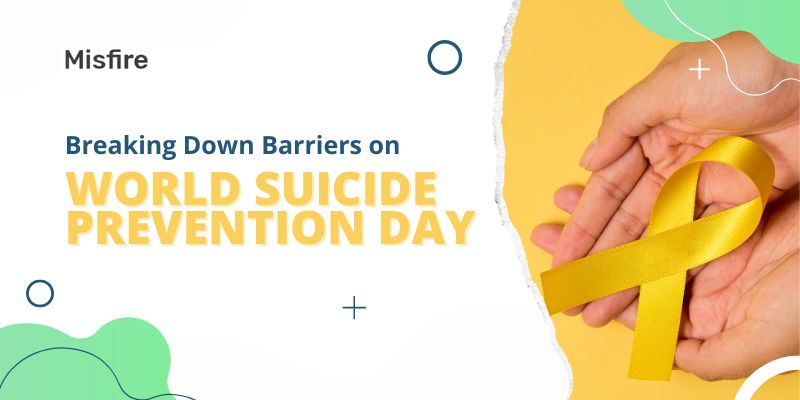World Suicide Prevention Day, observed annually on September 10th, serves as a crucial reminder that we all play a role in preventing suicide. It’s a day to raise awareness, foster empathy, and encourage open dialogue about mental health. In this article, we’ll explore why breaking down barriers is essential and how each of us can contribute to a more compassionate and supportive world.
The Stigma Surrounding Mental Health
-
Understanding the Stigma
Stigma remains one of the most significant barriers to seeking help for mental health issues. This stigma is deeply rooted in cultural and societal beliefs, often perpetuating the idea that mental health struggles are a personal failing rather than a medical condition. People may hesitate to discuss their struggles due to fear of judgment, discrimination, or being labeled as “weak” or “unstable.” This stigma perpetuates silence, creating a vicious cycle where individuals are discouraged from seeking the help they need. It’s essential to recognize that mental health, like physical health, requires care and attention. We must all work to dispel myths and misinformation surrounding mental illness.
-
Challenging Stereotypes
Challenging stereotypes associated with mental health is a collective responsibility. Contrary to popular belief, mental health conditions are not a sign of personal failure or weakness. They are complex, multifaceted issues influenced by a range of factors, including genetics, environment, and life experiences. By educating ourselves and others, we can dismantle harmful misconceptions. Mental health should be treated with the same seriousness and respect as any other medical condition. It’s vital to advocate for the understanding that seeking help is not only necessary but also a sign of strength and self-awareness.
The Importance of Conversation
-
Talking Saves Lives
Conversations about mental health can be life-saving. When we openly discuss mental health, we create a safe space for those who are suffering to express their feelings without fear of being judged. A simple “How are you feeling?” or “I’m here for you” can make a world of difference, especially to someone who may be feeling isolated or hopeless. Regular, open conversations help to break the silence that so often surrounds mental health issues, reducing feelings of shame and encouraging people to seek help. By reaching out to friends, family, and colleagues, we let them know they’re not alone and that it’s okay to talk about their mental health.
-
Active Listening
Active listening is a powerful tool in supporting those struggling with mental health. Listening without judgment, interruption, or the need to immediately offer advice allows the person speaking to feel heard and validated. It’s important to understand that sometimes, what someone needs most is simply a compassionate ear. By being fully present and engaged in the conversation, we can provide the emotional support that is often crucial in times of crisis. Remember, it’s not always about finding solutions—often, the act of listening itself can be healing.
Breaking Down Barriers
-
Educate Yourself
Education is key to breaking down barriers related to mental health. Understanding the different types of mental health conditions, recognizing the warning signs, and being aware of the resources available are all crucial steps in becoming a supportive ally. Knowledge empowers us to take action when someone might need support. Familiarize yourself with helplines, crisis centers, and local mental health services so that you can provide accurate information to those who may be struggling. The more informed we are, the better equipped we are to help others. Resources like Misfire provide Best Depression Resources, which can be invaluable in guiding someone towards the help they need.
-
Normalize Conversations
Normalizing conversations about mental health is essential in creating a culture where people feel comfortable seeking help. Share your experiences with mental health if you feel comfortable doing so—your openness can encourage others to do the same. By talking openly about mental health, we help to reduce the stigma and make it clear that it’s okay to seek professional help, whether that be therapy, counseling, or medication. Therapy and counseling should be seen as routine aspects of healthcare, not as something to be ashamed of. Normalizing these conversations makes it easier for everyone to access the support they need, including teen mental health resources, which are crucial for younger individuals facing unique challenges.
-
Be Kind
Kindness costs nothing but can mean everything to someone who is struggling. Simple acts of kindness—a smile, a kind word, or a supportive message—can have a profound impact on someone’s day. You never know what someone else might be going through, and your compassion might be the light they need in a dark time. In a world where we often rush through our days, taking a moment to connect with others on a human level can make all the difference. Kindness fosters a sense of community and belonging, which are vital in preventing feelings of isolation and despair.
Conclusion
On World Suicide Prevention Day, let’s commit to breaking down barriers. Let’s be compassionate listeners, advocates, and allies. By starting conversations and being there for one another, we can save lives and create a world where mental health is understood, accepted, and supported. Each of us has the power to make a difference in someone’s life—sometimes, all it takes is a conversation.
Remember: You are never alone, and seeking help is a courageous step. Reach out, listen, and let’s build a more empathetic society—one conversation at a time.
If you or someone you know is struggling, please seek professional help or contact a crisis hotline. You matter, and there is hope.
Note: This article is for informational purposes only and should not replace professional advice. If you or someone you know is in crisis, please seek immediate help.

